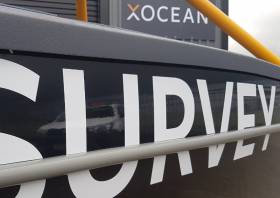Displaying items by tag: Robotics
Robotic Ship Class ‘Armada’ Could Be the Future of Offshore Support Vessels
A new ‘robotic’ ship that could be the future of offshore support vessels is currently undergoing sea trials in Vietnam after launching to sea this past summer.
The first of the Armada class of 78m service and survey vessels is being touted by its creators at Ocean Infinity as “designed for today’s tasks but with tomorrow’s in mind”.
Aside from its fuel efficiency, with a design readied for the latest fuel cell technology, a key aspect of the Armada is that it can sail with a skeleton crew while being controlled remotely from the shore.
“In due course they will be capable of working with no personnel offshore whilst also consuming solely renewable fuel such as ammonia”, the marine tech company says.
The ship currently undergoing trials is designed and built by VARD, the international shipbuilding group headquartered in Norway.
Following the on-schedule delivery of the ship, it will soon begin a transit to Norway where it will undergo fit-out of its remote system.
It will then begin integration with Ocean Infinity’s Remote Control Centre to enable lean-crewed operations for a range of maritime tasks, initially supporting offshore energy.
“We are doing something really difficult here,” Rich Daltry, Ocean Infinity’s marine technology director says, “because we believe it’s the next step in the maritime industry, and it will have a positive impact on people and the planet.”
Marine Tech Firm Xocean Eyes Expansion To North America & Beyond
Louth-based marine technology firm Xocean is following its recent funding boost with plans to expand into North America and eventually Asia, according to business news site Fora.
The company specialises in innovative robotics, particularly unmanned vehicles, and IoT technology to monitor and collect data at sea.
Earlier this year it was awarded €199,739 in funding over two years via the Marine Institute to transform marine monitoring and data collection, as previously reported on Afloat.ie.
In addition the Greenore-based business raised half a million euro from Chris Huskilson, former CEO of Canadian energy company Emera and now chairman of Xocean.
While its focus until now has been on northern Europe, with clients including the UK’s Maritime and Coastguard Agency, Xocean confirms it is in discussions to deliver its first projects in the US and Canada within the next six months.
Fora has much more on the story HERE.





























































